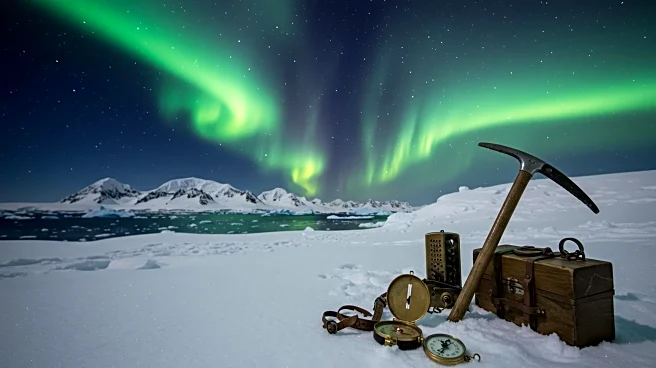What's Happening?
A receding glacier in Antarctica has uncovered the remains of Dennis 'Tink' Bell, a meteorologist who died in 1959. Bell was working for the Falkland Islands Dependencies Survey, a predecessor of the British Antarctic Survey (BAS), when he fell into a crevasse at Admiralty Bay on King George Island. His body was discovered by a Polish team among rocks exposed by the glacier's retreat. The identification was confirmed through DNA testing. Alongside Bell's remains, over 200 personal items were found, including a wristwatch, ski poles, and radio equipment. The discovery has provided closure to Bell's family, who expressed their shock and amazement at the news.
Why It's Important?
The discovery of Dennis Bell's remains highlights the ongoing impact of climate change, as receding glaciers continue to reveal historical artifacts and remains. This event underscores the importance of scientific research in understanding environmental changes and their consequences. For Bell's family, the discovery offers a sense of closure after decades of uncertainty. The identification of Bell's remains also demonstrates advancements in forensic science, particularly in DNA testing, which can provide answers to long-standing mysteries. This case may encourage further exploration and research in regions affected by climate change.
What's Next?
The remains of Dennis Bell have been transported to the Falkland Islands for further examination and identification. This discovery may prompt additional searches in the area for other historical artifacts or remains that could be exposed by the retreating glacier. The British Antarctic Survey and other research organizations may increase their focus on the effects of climate change in Antarctica, potentially leading to new scientific studies and environmental policies. Bell's family may plan a memorial or other commemorative activities to honor his legacy.
Beyond the Headlines
The revelation of Bell's remains after 66 years raises ethical questions about the treatment of human remains found in remote locations. It also highlights the cultural significance of preserving historical artifacts and the stories they tell. As climate change continues to alter landscapes, similar discoveries may become more common, prompting discussions on how to handle such findings respectfully and responsibly. This event may also inspire public interest in the history of Antarctic exploration and the challenges faced by early researchers.










